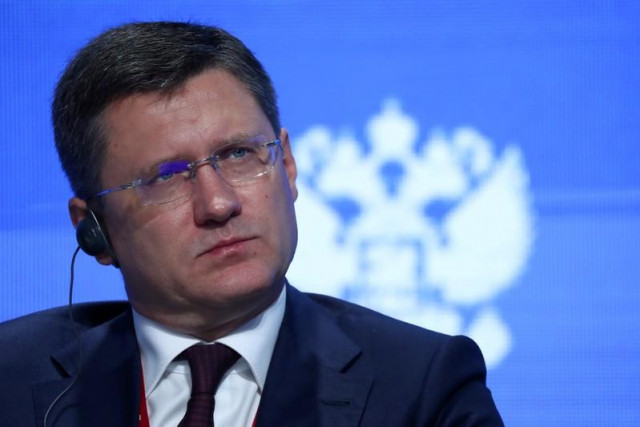Russian minister stresses reforming oil taxes
Says move will sustain output, boost producers' margins

Says move will sustain output, boost producers' margins. PHOTO:REUTERS
Alexander Novak said oil production in Russia, which has enough reserves of crude to sustain current production for over 50 years, could decline if the tax system remained unchanged.
"We have the highest oil taxes in the world. On average they amount to 68-70% of revenues. But in the case of West Siberian fields with no tax breaks, for example, they amount to 85%," Novak said in an interview.
Russia had long been the world's largest crude oil producer before being overtaken last year by the United States, whose production has skyrocketed because of the shale oil boom.
The cost of producing crude in Russia is higher than in Saudi Arabia, the world's top oil exporter. It is lower than in the United States, however, thanks to a weak local currency, fairly easy-to-extract reserves and cheaper oil services.
Russian oil production has repeatedly surprised on the upside over the past decade despite predictions of a slowdown in mature West Siberian fields, but Novak said the upward trend could soon end.
"We have great reserves but a big chunk is uneconomical under the current tax regime. The current tax regime doesn't allow us to raise output significantly," he said.
Like many other oil producers, Russia depends heavily on revenues from crude and gas.
The finance ministry has repeatedly opposed lowering taxes on the oil industry. "If we don't change the tax regime and don't encourage new field development in West Siberia and the Arctic, we won't be able to maintain the current level of production just a few years from now," Novak said.
He said the United States was able to compete with producers such as Russia thanks to cheap credit and taxes that are levied mainly on company profits.
In Russia, oil-industry taxes are based on revenues and output. Novak said he was proposing to widen the use of profit tax instead of the mineral extraction tax, which is based on output volumes rather than a project's profitability.
He said Russia should also give tax breaks for exploration work, small field development and advanced oil extraction technologies by allowing firms to amortise and deduct those costs from the mineral extraction tax.
Such measures could raise profit margins by $3-$5 a barrel, make Russian oil more competitive and bring into production up to 10 billion tonnes (73 billion barrels) of new reserves, which at current prices would generate $4 trillion for Russia.
Russia has been reducing oil output in tandem with the Organisation of the Petroleum Exporting Countries since 2017.
Novak said the production cut had allowed oil prices to be maintained at levels that encouraged investment in new fields.
He said in the longer term, oil would stay near $50 a barrel because booming production in the United States and elsewhere was offsetting the loss of Iranian and Venezuelan output and events such as last month's attacks on Saudi oil facilities.
"Everyone has forgotten about oil at $100 per barrel. We live based on mid-term oil price assumptions of $50… Our budget is based in 2019 on oil prices of $43-$45 per barrel."


















COMMENTS
Comments are moderated and generally will be posted if they are on-topic and not abusive.
For more information, please see our Comments FAQ